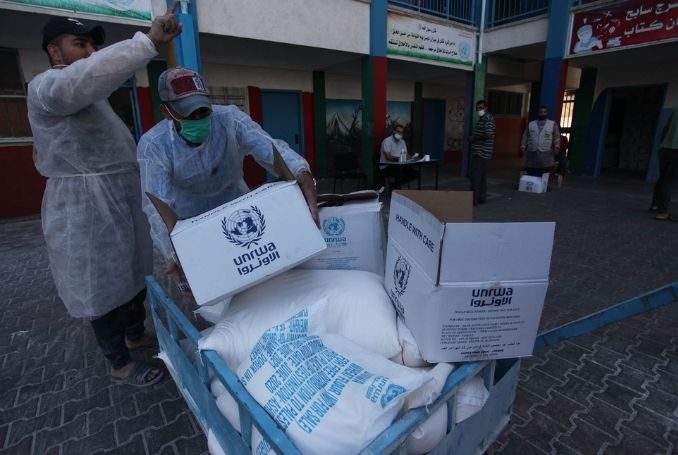
While aid trucks prepare to enter, Israeli ministers clash over the move, revealing internal divisions.
The office of Israeli Prime Minister Benjamin Netanyahu has announced that Israel will allow humanitarian aid into the Gaza Strip for a limited period, following a recommendation from the army.
An Israeli official told the Jerusalem Post that the decision will remain in place for one week, until new aid distribution centers—managed by the military and American companies—are operational. Most of these centers are expected to be located in southern Gaza.
Citing military sources, Israeli Army Radio reported that the first convoy of aid—consisting of food and medicine—will enter Gaza on Monday.
Oxfam’s Ghada Alhaddad spoke to @NewsHour on PBS about the catastrophic conditions she is witnessing and the devastating impacts of Israel’s total siege, blocking food, water, medicine, and aid, while trucks filled with live-saving supplies wait at the borders of #Gaza. pic.twitter.com/jQKAI78syc
— Oxfam International (@Oxfam) May 19, 2025
The US-based news website Axios confirmed that international organizations, including the World Food Programme (WFP) and World Central Kitchen, will manage the delivery until a new aid mechanism comes into effect on May 24. The aid includes flour for bakeries and essential medical supplies for hospitals.
Israel’s Channel 14 noted that the decision to permit aid sparked significant controversy during a cabinet meeting.
Israeli National Security Minister Itamar Ben-Gvir’s office criticized the move, claiming it would “strengthen Hamas.”
The Israeli Broadcasting Authority (KAN) reported that the decision was made without a formal vote, despite opposition from Finance Minister Bezalel Smotrich and others.
US Role and International Pressure
According to the Israeli newspaper Yedioth Ahronoth, several ministers attributed the decision to allow aid to mounting pressure from Washington.
US Special Envoy to the Middle East Steve Witkoff described conditions in Gaza as “extremely dangerous” and said that the Trump administration would not permit a humanitarian catastrophe to unfold.
Israeli army:
📌9 trucks carrying humanitarian aid entered the #Gaza sector today.📌 Aid trucks will enter the Gaza Strip through the Kerem Shalom crossing, arriving at the associations’ warehouses.
📌 International institutions will undertake the distribution of… pic.twitter.com/Ma9YPK76Q8
— Gulf Times (@GulfTimes_QATAR) May 19, 2025
“I don’t think there’s any daylight between President Trump’s position and Prime Minister Netanyahu’s position,” Witkoff told ABC News.
“It is complicated. It is logistically complicated. And the conditions on the ground are dangerous. There are still many unexploded shells all over the place,” he added.
Witkoff also said that mobile kitchens and trucks loaded with flour are en route and that Israel has committed to letting in a significant number of them.
The Price of Silence: Gaza’s Famine and the Erosion of Our Humanity
Famine Warnings
The World Food Programme warned that Gaza is racing against time to prevent famine. The organization called for immediate international action, warning that waiting for a formal famine declaration would come too late for many.
UNICEF echoed the urgency, stating that children in Gaza are facing relentless bombardment, deprivation of essentials, and a collapsing health system. The blockade on aid has significantly worsened the situation over the past two months.
Olga Cherevko, spokesperson for the UN Office for the Coordination of Humanitarian Affairs in Gaza, called for the immediate reopening of border crossings, describing conditions on the ground as “horrific” and “unbelievable.”
Turning Pasta into Bread: Gaza’s Struggle for Survival amid Famine and Siege
International Reactions
UN Secretary-General António Guterres reiterated the need for a permanent ceasefire, the unconditional release of all captives, and unrestricted humanitarian access.
The Turkish Foreign Ministry condemned Israel’s escalating military campaign, stating it undermines efforts for peace and demonstrates a lack of will for a lasting solution.
Ankara called for an immediate end to military operations and the full resumption of humanitarian aid, urging the international community to act in line with its legal and humanitarian responsibilities.
French Foreign Minister Jean-Noël Barrot said Israel’s move came after three months of diplomatic pressure. He emphasized that humanitarian aid to Gaza must be immediate, extensive, and unobstructed. “This aid must alleviate the catastrophic humanitarian conditions and help end the threat of famine,” Barrot said.
LIVE BLOG: UN to Oversee Aid Entry | Israeli Massacre in Khan Yunis – Day 591
Despite the partial reopening of aid corridors, Israel continues to enforce a tight siege on Gaza while carrying out near-constant aerial and artillery bombardments.
Residential neighborhoods and civilian infrastructure are being targeted, leading to soaring casualties.
Since October 7, 2023, Israel’s military campaign—backed by the United States—has resulted in approximately 174,000 Palestinians killed or wounded, the vast majority of them women and children. Over 11,000 people remain missing under the rubble.
(PC, AJA)









“US Special Envoy to the Middle East Steve Witkoff described conditions in Gaza as “extremely dangerous” and said that the Trump administration would not permit a humanitarian catastrophe to unfold.” This gets to me! What the f*ck was Trump doing when Israel violated the ceasefire like a pack of jackals on someone chained to the ground? The humanitarian catastrophe’s already well underway, thanks to Trump’s inaction. So, Trump doesn’t get to call the tune as far as Palestinians go. He’s forfeited that. What happens to Gaza is Gaza’s responsibility, nobody else’s. Now if he’d supply Hamas with antiaircraft missiles, like a predecessor did for the Afghan resistance from 1986 onwards …
Feed Gaza while bombing them! Reprehensible! Typical Nazi Zionist shit! It’s even worse! More pressure until the Nazi Zionist Regime breaks!